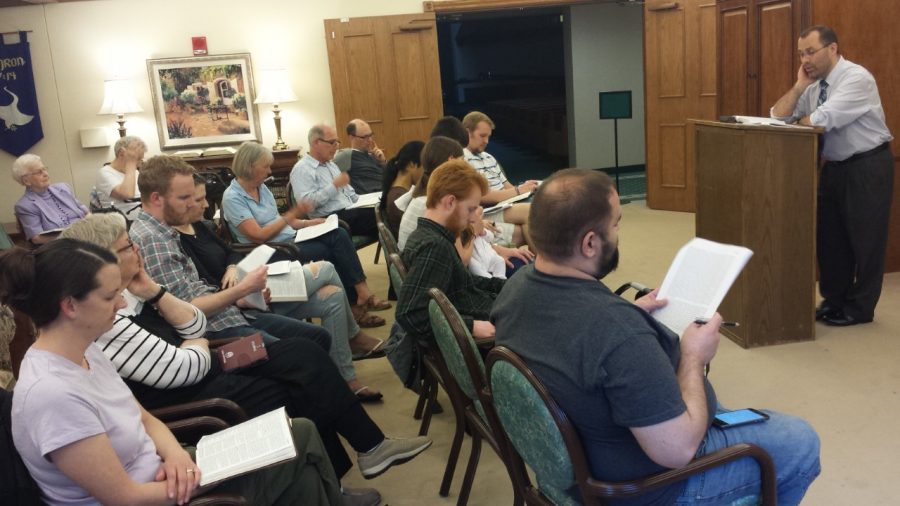Opinion: Semper Reformanda part three
Dr. David Noe speaking in front of a multi-generation Bible study he began last spring. Photo courtesy David Noe.
Which diet is the most ethical? Omnivore, flexitarian, pescatarian, vegetarian, vegan? We all have only one mouth for food and drink, and must consume something at least occasionally or our mortal bodies soon perish. Most of us spend some time thinking about the necessities and joys of eating and drinking.
Theodore Beza (1519-1605), French Reformer and friend of Calvin, believed that if we are going to be followers of Christ we need two mouths. With the first, carnal mouth, we eat to sustain our fleshly bodies, just like unbelievers. With the second mouth, the spiritual one, we eat and drink the body and blood of Christ Jesus unto eternal life. In this we are quite different from unbelievers, responding to the voice of our Lord who says “Whoever feeds on my flesh and drinks my blood has eternal life, and I will raise him up on the last day. For my flesh is true food, and my blood is true drink” (John 6).
How can we eat Christ’s flesh and drink his blood? Certainly not with our carnal mouths, for several reasons: 1. God condemns cannibalism in many places (Lam. 4.10); 2. Jesus intended that what he said to his disciples would make sense to them when they heard it (John 6.63); 3. He ascended bodily into heaven beyond our vision (Acts 1); and 4. We are told that he is like us in every way yet without sin (Heb.2.17).
Beza, following many church fathers but especially Augustine, explained that if Jesus’ body is consumed carnally as Lutherans and Roman Catholics taught, then Christ is not really like us. And if he is not really like us, then he cannot redeem us.
So what does it mean to eat with a spiritual mouth? It means that, “as certainly as we take and hold the sacrament in our hands and eat and drink it with our mouths, by which our physical life is then sustained, so certainly do we receive by faith, as the hand and mouth of our soul, the true body and true blood of Christ, our only Savior, in our souls for our spiritual life” (Belgic Confession 35).
Every food we eat, whether plant or animal, passes through and gives us only momentary strength. And no matter our carnal diet, our bodies will surely die. But what Christ offers fortifies our souls forever. This happens not by magic – many take of the covenant yet perish (I Cor. 10.5). It happens by the Holy Spirit’s power, working through the conduit of baptism and the supper to bring grace.
The Reformers believed that in the sacraments God preaches to us by “visible words”, strengthening our weak faith. These are signs, markers pointing beyond themselves: water for cleansing and death to sin; bread and wine for broken body and shed blood. They are also seals, impressed stamps of authenticity which show that we really belong to him.
With your second mouth, the spiritual one, taste and see that the Lord is good.




